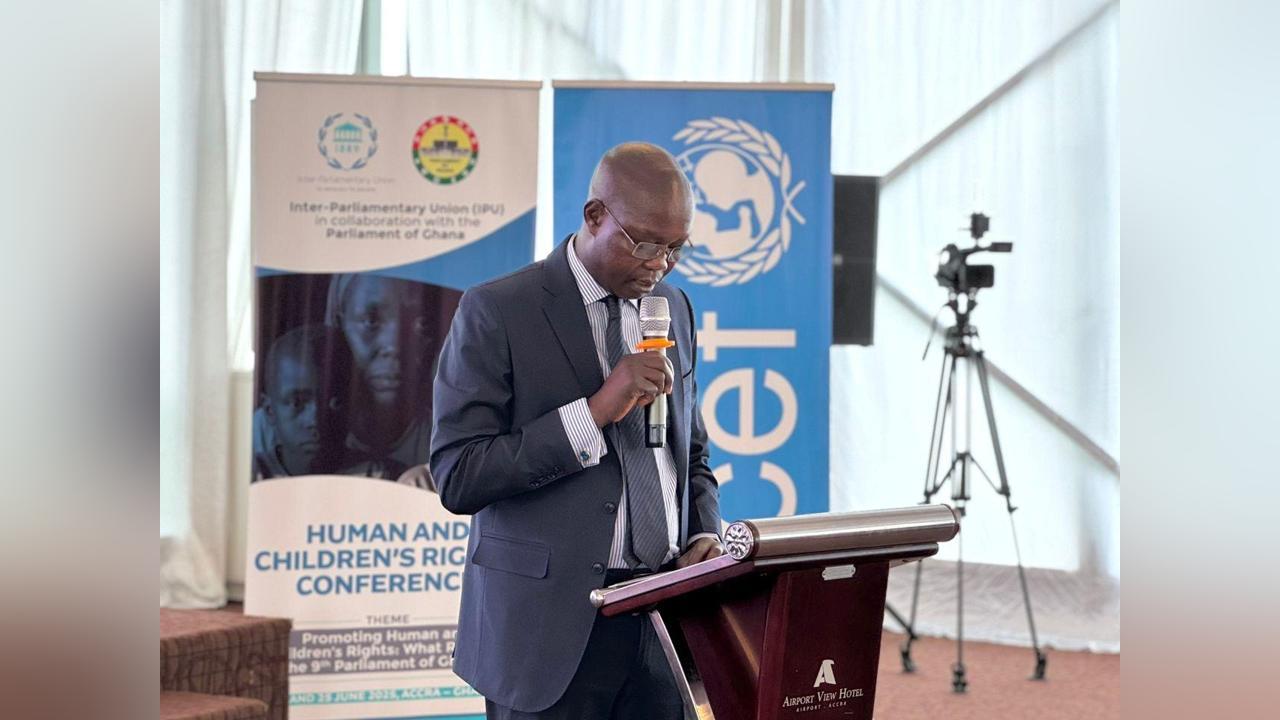Africa-Press – Ghana. Ghana’s parliament has reaffirmed its commitment to advancing human rights and upholding international obligations through robust engagement with the Universal Periodic Review (UPR) process.
The UPR process is a mechanism of the United Nations Human Rights Council (UNHRC) that assesses the human rights record of all UN member states.
The process aims to evaluate human rights situations, promote dialogue and cooperation, and improve them.
The First Deputy Speaker of Parliament, Mr. Bernard Ahiafor, emphasized the legislature’s critical role in protecting rights and monitoring executive compliance, particularly in implementing key UPR recommendations accepted by the state.
He said Parliament played a vital role in ensuring that human rights institutions were properly resourced by allocating funding to key bodies such as the Commission on Human Rights and Administrative Justice (CHRAJ).
“This support enables these institutions to raise awareness, handle complaints, and promote justice, ultimately contributing to the implementation of UPR recommendations,” Mr. Ahiafor said at the end of a two-day workshop in Accra.
The Inter-Parliamentary Union (IPU), in collaboration with the Parliament of Ghana, organized a two-day workshop on promoting human and children’s rights in Ghana on Tuesday, June 24, and Wednesday, June 25.
It was on the theme “Promoting Human and Children’s Rights: The Role of the Ninth Parliament of Ghana.”
The workshop was organized by the Committee on Human Rights for eight Committees in the Legal Cluster and the Committee on Education, Employment, Labor Relations and Pensions, Gender, Children, and Social Welfare.
The workshop had the goal of introducing new Members of Parliament (MPs) to the scope and responsibilities of their mandate, with particular focus on human rights; raising awareness of human rights principles and Parliament’s role in promoting them; informing participants about the Human Rights Council (HRC) and the UPR mechanism, and about the importance of parliamentary engagement throughout the review cycle.
Others were to explore avenues for the Parliament of Ghana to contribute to the implementation of UPR recommendations contained in the 2023 review and strengthen parliamentary efforts to combat child trafficking and child labour.
Mr. Ahiafor noted that MPs engaged directly with communities through forums, town hall meetings, and public education programs, providing a platform for citizens to express their concerns and influence national policy debates.
This approach, he explained, ensured that UPR-related actions were informed by local realities and experiences.
“Ghana’s Parliament has already acted on several key UPR recommendations supported by the state, including the abolition of the death penalty and the passage of the long-awaited Affirmative Action (Gender Equity) Bill,” he stated.
According to the First Deputy Speaker, Ghana’s Parliament had passed significant laws to address human rights issues, including the Domestic Violence Act (2007), protecting victims of domestic violence; the Human Trafficking Act (2005), combating human trafficking; and disability rights, promoting inclusivity and accessibility for persons with disabilities.
He told participants that supporting and monitoring UPR implementation was a shared responsibility that required strong institutions, committed leadership, and engaged citizens, adding that “Ghana’s parliament is committed to upholding human rights and promoting accountability through its legislative, oversight, and budgetary functions.
Madam Young Joo Lee, Social Policy Specialist, UNICEF, Ghana, urged parliamentarians to use the platform to deepen their understanding, share knowledge, and forge stronger partnerships to protect children’s rights.
“This emphasis is on translating commitments into policies and legal protections that can change lives and secure futures for Ghanaian children,” she said.
Mr. David Ekwe Ethuro, a former President of the Senate, Kenya, and a consultant, emphasized the importance of legislation, oversight, and budget allocation in advancing human rights.
Mr. Francis Xavier Sosu, a National Democratic Congress MP for Madina and a member of the Human Rights Committee of Parliament, addressing the gathering, advocated for critical attention to be accorded child rights, as it was a delicate subject matter.
He also praised Ghana’s ongoing efforts to abolish the death penalty, underscoring the country’s progress, and advocated for continued reforms.
Madam Maria Soledad Pazo, a Senior Human Rights Officer, UPR Branch, Human Rights Council and Treaty Mechanisms Division, United Nations Office of the High Commissioner on Human Rights (OHCHR) in Geneva, in her virtual address, outlined the functions of the United Nations (UN) Human Rights Council (HRC) and the UPR.
Madam Pauliina Mulhovo, Chief Social Policy, UNICEF, Ghana, emphasized the importance of parliamentarians in pursuing the ratification of the optional protocol and taking action to improve child rights in Ghana.
Mr. Mohammed Kheir, Human Rights Officer, OHCHR Regional Office, Dakar, in his virtual presentation, highlighted the vital role of Parliament in human rights and UPR processes.
Madam Mercy Larbi, a Deputy Commissioner of CHRAJ, discussed the agency’s roles and encouraged parliamentary support for its initiatives.
Dr. Isaac Annan, Advisor, Human Rights, Parliament of Ghana, elaborated on Ghana’s UPR process, emphasizing Parliament’s responsibilities in reporting, monitoring, and following up on recommendations to uphold human rights standards.
Discussions for the two-day engagement included Parliament’s role and function in the promotion of human rights; the United Nations HRC and the UPR; Ghana’s UPR process: lessons learned and way forward; Promoting strategies to support the implementation of the UPR recommendations and promoting the rights of the child in Ghana.
The rest were Addressing Child Labor and Trafficking: The Role of Parliament; Strengthening multi-stakeholder cooperation on the rights of the child and identifying parliamentary priorities and next steps.
The workshop brought together MPs, particularly those serving on the Human Rights Committee; parliamentary staff; representatives from the executive; the National Human Rights Commission of Ghana; civil society organizations active in the field of human and children’s rights; and students.
Dr Angela Dwamena-Aboagye, Executive Director, Ark Foundation Ghana, advocated for the upholding of childrens issues through a multi-stakeholder and case management collaboration.
She also called for extensive training for the Human Rights and Gender, Children and Social Welfare Committees in the area under discussion.
For More News And Analysis About Ghana Follow Africa-Press







